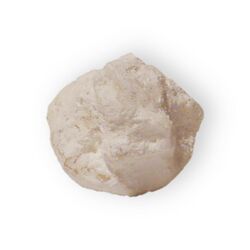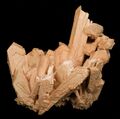Chemistry:Thenardite
| Thenardite | |
|---|---|
 Sodaville, Mineral County, Nevada | |
| General | |
| Category | Sulfate mineral |
| Formula (repeating unit) | Na2SO4 |
| Strunz classification | 7.AC.25 |
| Crystal system | Orthorhombic |
| Crystal class | Dipyramidal (mmm) H-M symbol: (2/m 2/m 2/m) |
| Space group | Fddd |
| Unit cell | a = 5.86 Å, b = 12.3 Å c = 9.82 Å; Z = 8 |
| Identification | |
| Formula mass | 142.04 g/mol |
| Color | White, grayish white, yellowish white, reddish white, brownish white |
| Crystal habit | Forms crust-like prismatic aggregates on matrix |
| Twinning | Interpenetration twinning on {001}; also on {100}; common on {110}; {011} |
| Cleavage | {010} perfect, {101} fair, {100} incomplete |
| Fracture | Splintery, uneven, hackly |
| Tenacity | Brittle |
| Mohs scale hardness | 2.5 |
| |re|er}} | Vitreous to resinous |
| Streak | White |
| Diaphaneity | Transparent |
| Specific gravity | 2.67–2.7, average = 2.68 |
| Optical properties | Biaxial (+) |
| Refractive index | nα = 1.471, nβ = 1.477, nγ = 1.484 |
| Birefringence | δ = 0.013 |
| Pleochroism | none |
| 2V angle | 83° |
| Ultraviolet fluorescence | Fluorescent and phosphorescent: short UV=bright white, long UV=bright white |
| Solubility | Soluble in water |
| Other characteristics | Salty taste |
| References | [1][2][3] |
Thenardite is an anhydrous sodium sulfate mineral, Na2SO4 which occurs in arid evaporite environments, specifically lakes and playas. It also occurs in dry caves and old mine workings as an efflorescence and as a crusty sublimate deposit around fumaroles. It occurs in volcanic caves on Mount Etna, Italy. It was first described in 1825 for an occurrence in the Espartinas Saltworks, Ciempozuelos, Madrid, Spain and was named for the French chemist, Louis Jacques Thénard (1777–1826).[2]
Thenardite crystallizes in the orthorhombic system and often forms yellowish, reddish to gray white prismatic crystals although usually in massive crust deposits. Thenardite is fluorescent, white in shortwave and yellow-green in longwave UV radiation.
In humid conditions, thenardite progressively absorbs water and converts to the deca-hydrated mineral mirabilite, Na2SO4 · 10 H2O.
Gallery
-
Crystal structure of thenardite
-
Thenardite, cluster of transparent crystals from Soda Lake, California. Width of cluster is 9 cm (3.5 in)
-
Tan thenardite pseudomorphing mirabilite crystals from the Boron, California area. Cluster is 6 x 5.5 cm.
References
- ↑ Thenardite at Webmineral
- ↑ 2.0 2.1 Thenardite at Mindat
- ↑ Handbook of Mineralogy
- ↑ Warr, L.N. (2021). "IMA–CNMNC approved mineral symbols". Mineralogical Magazine 85 (3): 291–320. doi:10.1180/mgm.2021.43. Bibcode: 2021MinM...85..291W. https://www.cambridge.org/core/journals/mineralogical-magazine/article/imacnmnc-approved-mineral-symbols/62311F45ED37831D78603C6E6B25EE0A.
Bibliography
- Palache, P.; Berman H.; Frondel, C. (1960). "Dana's System of Mineralogy, Volume II: Halides, Nitrates, Borates, Carbonates, Sulfates, Phosphates, Arsenates, Tungstates, Molybdates, Etc. (Seventh Edition)" John Wiley and Sons, Inc., New York, pp. 404-407.



